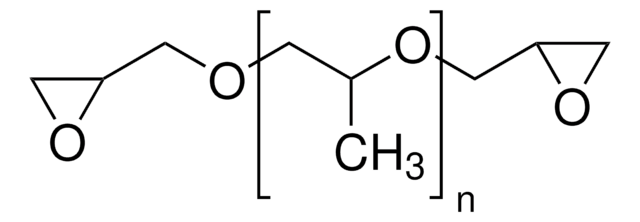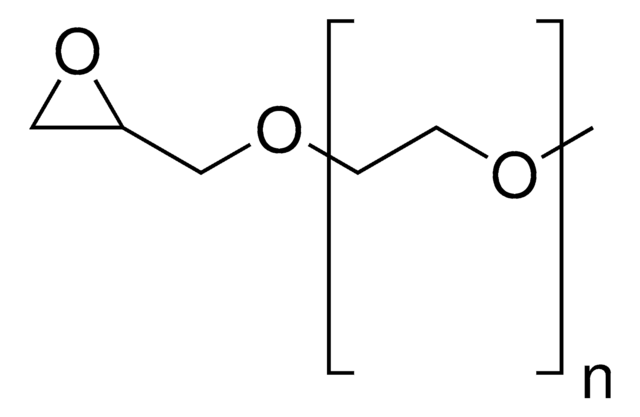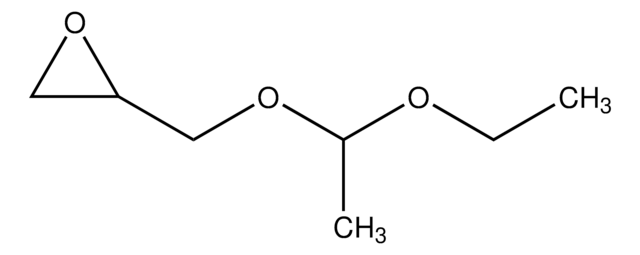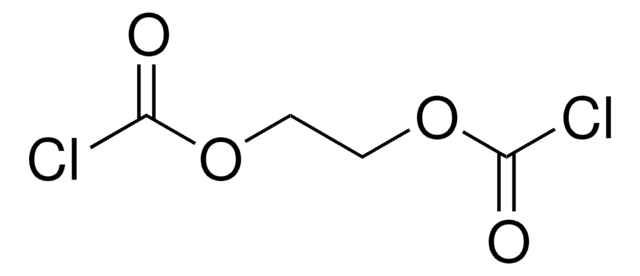731811
Poly(ethylene glycol) diglycidyl ether
average MN 2,000, cross-linking reagent amine reactive
Sinonimo/i:
Polyethylene glycol, Diepoxy PEG, PEG diglycidyl ether, Polyoxyethylene bis(glycidyl ether)
About This Item
Prodotti consigliati
Nome del prodotto
Poly(ethylene glycol) diglycidyl ether, average Mn 2,000
Stato
liquid
Livello qualitativo
PM
average Mn 2,000
Impiego in reazioni chimiche
reagent type: cross-linking reagent
reactivity: amine reactive
Punto di fusione
49-54 °C
Architettura del polimero
shape: linear
functionality: homobifunctional
Temperatura di conservazione
2-8°C
Stringa SMILE
O1C(C1)COCCOCC2OC2
InChI
1S/C8H14O4/c1(9-3-7-5-11-7)2-10-4-8-6-12-8/h7-8H,1-6H2
AOBIOSPNXBMOAT-UHFFFAOYSA-N
Cerchi prodotti simili? Visita Guida al confronto tra prodotti
Applicazioni
- Impact of Poly(ethylene glycol) Diglycidyl Ether on PVC/PEO Blend Properties: This study examines the influence of PEGDE on the tensile properties, morphology, and electrical conductivity of PVC/PEO blends, highlighting its effectiveness as a surface modifier (Supri et al., 2016).
- Flexible Wearable Sensors Based on CNTs and PEGDGE: This research focuses on developing flexible wearable sensors by reinforcing carbon nanotubes with PEGDGE, analyzing their strain sensitivity and mechanical properties (Del Bosque et al., 2021).
- Network Polymers via Addition Reactions of Multifunctional-Amine and PEGDGE: The synthesis of network polymers through the reaction of multifunctional-amine and PEGDGE or diacrylate compounds, exploring their application in materials science (Naga et al., 2020).
- Modification of Alkali Lignin with PEGDGE for Bio-lubricant Applications: This study modifies alkali lignin with PEGDGE to enhance its use as a thickener in bio-lubricant formulations, demonstrating improved dispersion and stability (Cortés-Triviño et al., 2018).
- Characterization of Injectable Hyaluronic Acid Dermal Fillers Cross-Linked with PEGDGE: Investigates hyaluronic acid dermal fillers cross-linked with PEGDGE, focusing on their physicochemical properties and applications in aesthetic medicine (Zerbinati et al., 2021).
Codice della classe di stoccaggio
12 - Non Combustible Liquids
Classe di pericolosità dell'acqua (WGK)
WGK 3
Scegli una delle versioni più recenti:
Possiedi già questo prodotto?
I documenti relativi ai prodotti acquistati recentemente sono disponibili nell’Archivio dei documenti.
I clienti hanno visto anche
Articoli
Highlighting new synthetic modifications of PEG to improve the mechanical properties and degradation of resulting hydrogels in tissue engineering applications.
Highlighting existing and novel fabrication methods for both, solid and hydrogel-based scaffold for tissue engineering applications.
Il team dei nostri ricercatori vanta grande esperienza in tutte le aree della ricerca quali Life Science, scienza dei materiali, sintesi chimica, cromatografia, discipline analitiche, ecc..
Contatta l'Assistenza Tecnica.










